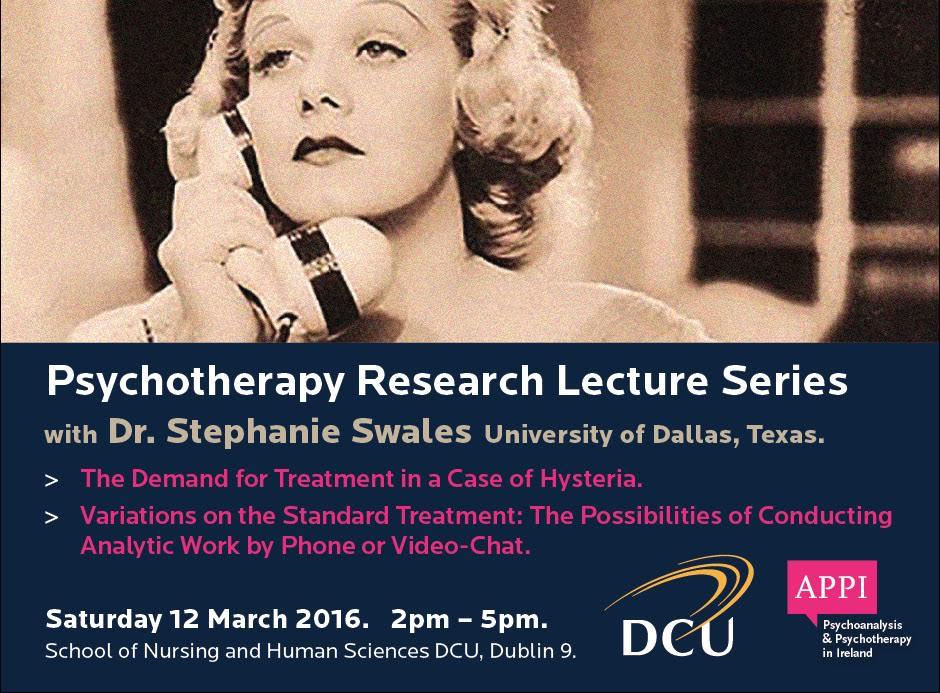

Psychotherapy Research 2016 Lecture Series with Dr. Stephanie Swales
APPI and the School of Nursing and Human Sciences (SNHS) in DCU are pleased to invite you to join them at the launch of a series of Psychoanalytically informed Research lectures on Saturday 12th March, 2-5pm
Both APPI and the SNHS are delighted to announce that the lecture series will commence with two lectures given by Dr Stephanie Swales, the first dealing with the examination of a clinical case of Hysteria, the second focusing upon a variation of the standard psychoanalytic treatment.
This year's psychotherapy research lecture series will focus on psychoanalysis and research and will included papers on Psychopathy, Transference, Sexuality, The Environment, Prescription Drugs, Student Psychotherapy Services, and Relationships. A full schedule of lectures will be published on 12th March 2016.
Stephanie Swales is an Assistant Professor of Psychology at the University of Dallas in Texas where she teaches psychoanalytic theory and practice to graduate students as well as coursework to undergraduates that is rooted in the humanistic and psychoanalytic traditions. She is also a licensed clinical psychologist and maintains a private analytic practice working with children and adults. Stephanie is undergoing her analytic formation with the Lacanian School of Psychoanalysis based in San Francisco, California. She is the founder and facilitator of the Dallas/Fort Worth Area Lacan Study Group. Her first book, Perversion: A Lacanian Psychoanalytic Approach to the Subject, was published by Routledge in 2012.
SCHEDULE:
2pm: Welcome and introduction by Gerry Moore
–
Lecture 1 - The Demand for Treatment in a Case of Hysteria. Chair: Gerry Moore
The request for treatment is often anything but straightforward. In each analytic case, we ask who is making the demand, and for what? This case highlights how the process of answering that question can be part and parcel of turning the presenting problem into a psychoanalytic symptom and of shifting the analysand's stance from one of a will-not-to-know to a desire to discover something about the unconscious. The analysand's initial presenting problem included complaints of suicidality, psychosomatic seizures, relationship problems, depression, cutting herself, having been sexually abused, family discord, being unable to work, and not having a purpose in life. The analysand's past failed treatments are discussed in light of her transference to the analyst and manner of engaging in the analysis. In helping the analysand engage fruitfully in this treatment, exercising the desire of the analyst as Lacan understood it proved to be a crucial difference between this and her previous treatments.
–
Coffee
–
Lecture 2 - Variations on the Standard Treatment: The Possibilities of Conducting Analytic Work by Phone or Video-Chat. Chair: Carol Owens
Many psychoanalysts today conduct analytic work over the phone or via video-chat—either for brief periods of time when travelling, when an analysand moves away and wants to continue working with that analyst, or sometimes from the start of the treatment. This practice, although it is becoming increasingly commonplace, is not often discussed in person or in print. This paper is devoted to asking questions about theoretical and clinical bases for analytic work via phone or video-chat. In what ways are the analytic frame and the direction of the treatment modified or not? Is there something crucial to the progress of analysis that is lost when the sessions are conducted from a distance with the assistance of technology?
–
Price: DCU staff/students: Free, Other Student / Unwaged: €5, APPI member: €10, Non APPI members: €15
Please register your intention to attend with carolowensappi@gmail.com for catering purposes
--
Upcoming: International Interdisciplinary Supervision Conference, DCU, 20-21 May, 2016
Click link below to attend or to submit an abstract to present a paper/workshop/symposium
https://www.dcu.ie/snhs/supervconf2016.shtml
